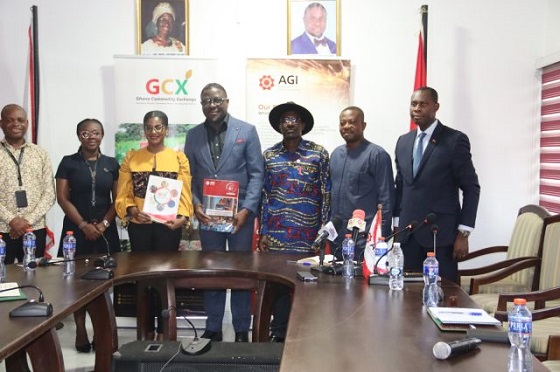The Association of Ghana Industries has signed a Memorandum of Understanding (MoU) with the Ghana Commodity Exchange to support the agriculture sector increase liquidity in commodity markets and enhance price discovery.
The parties aim to establish a commercial project to promote food security, and nutrition as well as to create a platform for the trading of designated agricultural commodities.
The agreement will also help improve existing value chains by linking production to high value markets, increase farmers bargaining power and ensure the integrity and transparency of trade and reduce default risks.

Dr Humphrey Ayim-Darke, President of the AGI, who signed the deal with Tucci Ivowi, the chief executive officer of the Ghana Commodity Exchange, said the AGI believed that the relationship was critical for the agriculture value chain activities from the farm gates to the consumer and from businesses to businesses.
“We believe the AGI fits into this relationship perfectly to enhance the clear agenda of the Ghana Commodity Exchange. We believe that this is just the beginning. There are other products for the same space. But it is so critical to start with the agriculture space because it has significant impact on our macro economic fundamentals.”
He said with commitment and transparency, the partners would enhance and create wealth for the farmers and the business community.
Responding, Mrs Ivowi said the partnership had taken a deliberate decision to start with agricultural commodities because they were key to growth and industrialisation.
“We cannot truly industrialise a nation if we haven’t got a strong agricultural sector. So we’re really working together with our partners in the private sector to boost this industry. We believe that the future is now and the future is in agriculture,” she said.
“I don’t know of many industries that don’t touch agriculture in one way, shape, or form and at the heart of it, which is of concern to everyone.”
She expressed excitement about the private sector’s readiness to work with the Ghana Commodity Exchange to really improve, scale up and accelerate the efforts that the Exchange is making.
“So I think we have a very good place to be with this partnership,” Mrs Ivowi said.
She said the partners were looking to start as soon as possible with maize and soya beans and add more commodities as and when storage facilities were available.
“We started with security crops because we wanted to ensure that the nation has these crops available, but we do plan to expand to other crops,” she said, adding that last year the Exchange conducted some trading of cashew.
“We’ve just done some value chain analysis of shea nuts and also for cow peas. Beyond the agricultural commodities, in the medium term we will be looking at metals minerals so that we’ll be having discussions with different institutions,” she said.
Ms Ivowi said aside from warehouses, interventions were needed in the areas such as transportation and logistics as it was difficult getting produce from farm gates to various warehouses and onto the end client.
Mr William Agyei-Manu, Chairman Agribusiness sector of AGI, said the move was to support existing government’s projects such as commercialisation of agriculture.
He said the focus was to explore ways to make all year round raw materials available to industry to go into processing to help reduce imports.
“So we’re trying to now streamline the import substitution to see how we can create jobs also make products available for industry and also to ensure that there is a guaranteed market for what the private sector produces, and that also to streamline the marketing of agricultural commodities,” Mr Agyei-Manu added.
GNA





